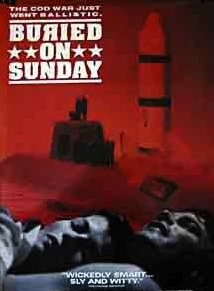Friday, March 12, 1993.
BURIED ON SUNDAY. Co-written by William Fleming. Music by Marty Simon. Co-written and directed by Paul Donovan. Running time: 94 minutes. Mature with the B.C. Classifier's warning: occasional coarse language.
FUNNIEST THING.
Called upon by Ottawa to participate in the sacred ritual of shared sacrifice, the 6,000 residents of Solomon Gundy Island go nuts. Mice for far too long, the Atlantic Canadians give forth with a mighty roar.
At issue in writer-director Paul Donovan's wonderfully whimsical Buried on Sunday are fish stocks and fishing rights. Because the stocks are low, the islanders are ordered to stop fishing for the next three years.
"Experts," they're told, have taken the tough decision. Via satellite, the Hon. Nelson Stidwell (Henry Czerny), Minister of Fisheries and Atmosphere, assures them that their community's pain will result in overall national gain.
There are no "experts" present at the town hall meeting on Solomon Gundy. Outraged and frustrated, the honest working men and women focus their anger on the next best thing, self-satisfied federal fixer Dexter Lexcannon (Maury Chaykin).
"I say we hang him," says a fisherman's widow (Deb Allen). In no time at all, the Prime Minister's personal envoy is the guest of honour at a spirited, crowd-pleasing necktie party.
Like American film-maker Joel (Falling Down) Schumacher, Donovan has been energized by the currents of discontent abroad in the land. His achievement is in finding comic inspiration that is both timely and universal in a series of recognizably Canadian circumstances.
At a second town meeting, Solomon Gundy's charismatic mayor Augustus Knickle (Paul Gross) argues that, under the terms of 1713's Treaty of Utrecht, the islanders have the right of secession. Then and there, he proclaims the independent "Republic of Solomon Gundy."
Fisheries Minister Stidwell is unimpressed. "Nobody outside of this room is going to take you seriously," sniffs the sophisticated, unctuously plastic politician.
"Unless," says Knickle, "Solomon Gundy were a nuclear power."
Did I mention the Russian sub?
A delicious bit of dramatic invention, K-672, a disabled veteran of the former Soviet navy's silent service, limps into the island's picturesque port at just the right moment.
Its crew, low on morale, agrees to sell all of their weaponry, up to and including the vessel's computer programmable nuclear missiles. Pick your target.
Among Donovan's targets are dishonest political deal-makers, bureaucratic status-seekers and Canada's Wonderland theme park, an exercise in American-style bad taste located near Toronto. His film skewers the lot with enviable accuracy.
Less successful is the picture's romantic subplot, an attempt to pair sadder-but-wiser ministerial aide Noel Desnoyer (Denise Virieux) with the hunky Knickle. As attractive as they are, the love story tends to slow the comic momentum.
In his comic novel Paint Cans (1991), Donovan took savage delight in satirizing the inner workings of Telefilm Canada, the federal film-funding agency. This year, he takes aim at the inner cabinet.
A gift to the taxpayers, his Buried on Sunday is the funniest Canadian-made film in an age.
The above is a restored version of a Province review by Michael Walsh originally published in 1993. For additional information on this archived material, please visit my FAQ.
Afterword: On the eve of Canada's 2015 federal election, I have to wonder what advice Paul Donovan might have for voters. In common with his B.C. and Québécois colleagues, the Halifax-based writer-director has a keen appreciation of the regional disparities at play in the nation's social dynamic. His fourth feature film, 1988's The Squamish Five, told the story of a somewhat inept "urban guerrilla" group responsible for a number of bombings in and around Vancouver in 1982. Made for CBC-TV, it was an historical thriller with none of the wacky humour that he demonstrated just four years later in Buried on Sunday. Together with his brother Michael, Donovan founded Salter Street Films in 1982 to make movies in Nova Scotia, where his political-separation comedy was filmed. In 1991, he applied his satirical scalpel to Telefilm Canada, making fine sport of the federal film-funding agency in the comic novel Paint Cans. Three years later, Salter Street produced a screen adaptation of the book, a movie made without Telefilm's financial participation. Although science-fiction fans recognize Donovan's name as the creator of the four-season TV series Lexx (1997-2002), his studio's longest-running small-screen success is CBC-TV's This Hour Has 22 Minutes, a showcase for Maritimes-based political comedy since 1993. American political activist Michael Moore found the Donovan brothers to be kindred spirits, and sought out Salter Street to produce his 2002 documentary feature, Bowling for Columbine. The picture won an Academy Award, and Michael Donovan brought an Oscar home to Halifax. As suggestive as the evidence is, there's no real way of knowing how Paul Donovan will mark his secret ballot. What we do know is that, regardless of the election's outcome, he'll find the humour in it.
